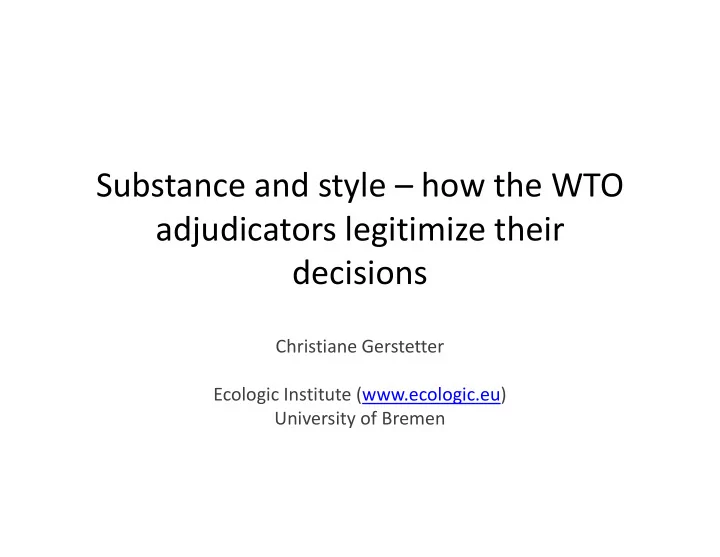

Substance and style – how the WTO adjudicators legitimize their decisions decisions Christiane Gerstetter Ecologic Institute (www.ecologic.eu) University of Bremen
Question „How do the WTO judicial decision-makers legitimize their decisions“? Legitimate: Legitimate: Legitimacy in normative sense: decision, law, behaviour worthy of recognition Legitimacy in empirical sense: actual, empirical acceptance of decision, law, behaviour as worthy of recognition
Underlying assumptions (I) • Law is more or less indeterminate • Courts/judges have certain space of agency (beyond being the „mouth of the law“), within the constraints of the law • (International) courts use this space strategically to • (International) courts use this space strategically to come to decisions that are both in line with the law and the anticipated preferences of Members/Parties • Courts cannot and do not state in their judgments the full range of reasons for why they come to a certain decision – they need to appear to use arguments recognised as legal arguments
Underlying assumptions (II) For a judicial decision to be perceived as several dimensions are relevant Outcome of Arguments used for Controlled decision, legal justifying by court by court interpretation interpretation judicial decision judicial decision („substance“) („style“) (Mostly) not Institutional and Legitimacy of wider controlled procedural factors institution/court as by court institution
Substance Result: • Relatively balanced outcome in terms of legal interpretations favoring/restricting regulatory autonomy of WTO Members (not in terms of who wins/loses – statistically defendants mostly lose) Method: • Reading of decisions in non-trade/public interest cases (e.g. all Art. XX GATT cases, SPS cases) – most controversial cases • Focus on, but not limited to Appellate Body reports • Interpretation is considered as deliberate choice if there are – according to literature etc. – defensible alternative interpretations
Some legitimising elements of WTO judicial style • Strong reliance on textualism („the mouth of the law“) • Strong (apparent) reliance on precedents • Very long decisions, repeating every detail of parties‘ arguments parties‘ arguments • Ample use of judicial economy: decision not to rule on certain of the litigants’ legal arguments, deeming these unnecessary to solving the dispute at hand • Explicit statements on what has not been decided
Effects of judicial style • Presenting decisions as inevitably resulting from text of WTO law, Appellate Body as interpreter, not maker of law interpreter, not maker of law • Avoiding potentially controversial decisions
Conclusion „Through a reading of the dispute settlement decisions we can show that WTO judicial decision-makers actively seek to legitimise decision-makers actively seek to legitimise their decisions both through offering balanced interpretations of the law (in non-trade cases) and through using a certain judicial style.“
Successfully generating legitimacy? If measured by absence of countermeasures from WTO Members, probably yes • Little activity by WTO Members to overturn decisions of WTO dispute settlement of WTO dispute settlement • Some discussions on reform of WTO dispute settlement, but limited ambition • No high levels of non-compliance • No abatement in use of system over time
Thank you! Comments and questions: Comments and questions: christiane.gerstetter@ecologic.eu
Recommend
More recommend